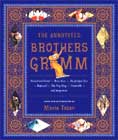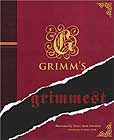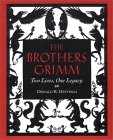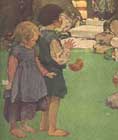

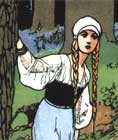
Author's Notes
translated by Margaret Hunt
Return
to
Household Tales:
Table of Contents
Previous
Tale:
The Three Children of Fortune
Next
Tale:
The Wolf and the Man
SurLaLune Fairy Tales Main Page
How
Six Men Got On in the World
THERE was once a man who understood
all kinds of arts; he served in war, and behaved well and bravely, but
when the war was over he received his dismissal, and three farthings for
his expenses on the way. "Stop," said he, "I shall not
be content with this. If I can only meet with the right people, the King
will yet have to give me all the treasure of the country." Then full
of anger he went into the forest, and saw a man standing therein who had
plucked up six trees as if they were blades of corn. He said to him, "Wilt
thou be my servant and go with me?" "Yes," he answered,
"but, first, I will take this little bundle of sticks home to my
mother," and he took one of the trees, and wrapped it round the five
others, lifted the bundle on his back, and carried it away. Then he returned
and went with his master, who said, "We two ought to be able to get
through the world very well," and when they had walked on for a short
while they found a huntsman who was kneeling, had shouldered his gun,
and was about to fire. The master said to him, "Huntsman, what art
thou going to shoot?" He answered, "Two miles from here a fly
is sitting on the branch of an oak-tree, and I want to shoot its left
eye out." "Oh, come with me," said the man, "if we
three are together, we certainly ought to be able to get on in the world!"
The huntsman was ready, and went with him, and they came to seven windmills
whose sails were turning round with great speed, and yet no wind was blowing
either on the right or the left, and no leaf was stirring. Then said the
man, "I know not what is driving the windmills, not a breath of air
is stirring," and he went onwards with his servants, and when they
had walked two miles they saw a man sitting on a tree who was shutting
one nostril, and blowing out of the other. "Good gracious! what are
you doing up there?" He answered, "Two miles from here are seven
windmills; look, I am blowing them till they turn round." "Oh,
come with me," said the man. "If we four are together, we shall
carry the whole world before us!" Then the blower came down and went
with him, and after a while they saw a man who was standing on one leg
and had taken off the other, and laid it beside him. Then the master said,
"You have arranged things very comfortably to have a rest."
"I am a runner," he replied, "and to stop myself running
far too fast, I have taken off one of my legs, for if I run with both,
I go quicker than any bird can fly." "Oh, go with me. If we
five are together, we shall carry the whole world before us." So
he went with them, and it was not long before they met a man who wore
a cap, but had put it quite on one ear. Then the master said to him, "Gracefully,
gracefully, don't stick your cap on one ear, you look just like a tom-fool!"
"I must not wear it otherwise," said he, "for if I set
my hat straight, a terrible frost comes on, and all the birds in the air
are frozen, and drop dead on the ground." "Oh, come with me,"
said the master. "If we six are together, we can carry the whole
world before us."
Now the six came to a town where the King had proclaimed that whosoever ran a race with his daughter and won the victory, should be her husband, but whosoever lost it, must lose his head. Then the man presented himself and said, "I will, however, let my servant run for me." The King replied, "Then his life also must be staked, so that his head and thine are both set on the victory." When that was settled and made secure, the man buckled the other leg on the runner, and said to him, "Now be nimble, and help us to win." It was fixed that the one who was first to bring some water from a far distant well was to be the victor. The runner received a pitcher, and the King's daughter one too, and they began to run at the same time, but in an instant, when the King's daughter had got a very little way, the people who were looking on could see no more of the runner, and it was just as if the wind had whistled by. In a short time he reached the well, filled his pitcher with water, and turned back. Half-way home, however, he was overcome with fatigue, and set his pitcher down, lay down himself, and fell asleep. He had, however, made a pillow of a horse's skull which was lying on the ground, in order that he might lie uncomfortably, and soon wake up again. In the meantime the King's daughter, who could also run very well quite as well as any ordinary mortal can had reached the well, and was hurrying back with her pitcher full of water, and when she saw the runner lying there asleep, she was glad and said, "My enemy is delivered over into my hands," emptied his pitcher, and ran on. And now all would have been lost if by good luck the huntsman had not been standing at the top of the castle, and had not seen everything with his sharp eyes. Then said he, "The King's daughter shall still not prevail against us;" and he loaded his gun, and shot so cleverly, that he shot the horse's skull away from under the runner's head without hurting him. Then the runner awoke, leapt up, and saw that his pitcher was empty, and that the King's daughter was already far in advance. He did not lose heart, however, but ran back to the well with his pitcher, again drew some water, and was at home again, ten minutes before the King's daughter. "Behold!" said he, "I have not bestirred myself till now, it did not deserve to be called running before."
But it pained the King, and still more his daughter, that she should be carried off by a common disbanded soldier like that; so they took counsel with each other how to get rid of him and his companions. Then said the King to her, "I have thought of a way; don't be afraid, they shall not come back again." And he said to them, "You shall now make merry together, and eat and drink," and he conducted them to a room which had a floor of iron, and the doors also were of iron, and the windows were guarded with iron bars. There was a table in the room covered with delicious food, and the King said to them, "Go in, and enjoy yourselves." And when they were inside, he ordered the doors to be shut and bolted. Then he sent for the cook, and commanded him to make a fire under the room until the iron became red-hot. This the cook did, and the six who were sitting at table began to feel quite warm, and they thought the heat was caused by the food; but as it became still greater, and they wanted to get out, and found that the doors and windows were bolted, they became aware that the King must have an evil intention, and wanted to suffocate them. "He shall not succeed, however," said the one with the cap. "I will cause a frost to come, before which the fire shall be ashamed, and creep away." Then he put his cap on straight, and immediately there came such a frost that all heat disappeared, and the food on the dishes began to freeze. When an hour or two had passed by, and the King believed that they had perished in the heat, he had the doors opened to behold them himself. But when the doors were opened, all six were standing there, alive and well, and said that they should very much like to get out to warm themselves, for the very food was fast frozen to the dishes with the cold. Then, full of anger, the King went down to the cook, scolded him, and asked why he had not done what he had been ordered to do. But the cook replied, "There is heat enough there, just look yourself." Then the King saw that a fierce fire was burning under the iron room, and perceived that there was no getting the better of the six in this way.
Again the King considered how to get rid of his unpleasant guests, and caused their chief to be brought and said, "If thou wilt take gold and renounce my daughter, thou shalt have as much as thou wilt."
"Oh, yes, Lord King," he answered, "give me as much as my servant can carry, and I will not ask for your daughter."
On this the King was satisfied, and the other continued,
"In fourteen days, I will come and fetch it." Thereupon he summoned
together all the tailors in the whole kingdom, and they were to sit for
fourteen days and sew a sack. And when it was ready, the strong one who
could tear up trees had to take it on his back, and go with it to the
King. Then said the King, "Who can that strong fellow be who is carrying
a bundle of linen on his back that is as big as a house?" and he
was alarmed and said, "What a lot of gold he can carry away!"
Then he commanded a ton of gold to be brought; it took sixteen of his
strongest men to carry it, but the strong one snatched it up in one hand,
put it in his sack, and said, "Why don't you bring more at the same
time? that hardly covers the bottom!" Then, little by little, the
King caused all his treasure to be brought thither, and the strong one
pushed it into the sack, and still the sack was not half full with it."
"Bring more," cried he, "these few crumbs don't fill it."
Then seven thousand carts with gold had to be gathered together in the
whole kingdom, and the strong one thrust them and the oxen harnessed to
them into his sack. "I will examine it no longer," said he,
"but will just take what comes, so long as the sack is but full."
When all that was inside, there was still room for a great deal more;
Then he said, "I will just make an end of the thing; people do sometimes
tie up a sack even when it is not full." So he took it on his back,
and went away with his comrades. When the King now saw how one single
man was carrying away the entire wealth of the country, he became enraged,
and bade his horsemen mount and pursue the six, and ordered them to take
the sack away from the strong one. Two regiments speedily overtook the
six, and called out, "You are prisoners, put down the sack with the
gold, or you will all be cut to pieces!" "What say you?"
cried the blower, "that we are prisoners! Rather than that should
happen, all of you shall dance about in the air." And he closed one
nostril, and with the other blew on the two regiments. Then they were
driven away from each other, and carried into the blue sky over all the
mountains one here, the other there. One sergeant cried for mercy; he
had nine wounds, and was a brave fellow who did not deserve ill treatment.
The blower stopped a little so that he came down without injury, and then
the blower said to him, "Now go home to thy King, and tell him he
had better send some more horsemen, and I will blow them all into the
air." When the King was informed of this he said, "Let the rascals
go. They have the best of it." Then the six conveyed the riches home,
divided it amongst them, and lived in content until their death.
Next
Tale:
The Wolf and the Man
Grimm, Jacob and Wilhelm. Household Tales. Margaret Hunt, translator. London: George Bell, 1884, 1892. 2 volumes.
Notes
From Zwehrn. A story from Paderborn is almost exactly like it. The description of the runner is taken from it; in the Hessian story, he had fastened a cannon to his leg to make himself go more slowly. In the Paderborn story there is a Listener besides, who, when he takes the stopping from his ears, can hear the dead under ground singing. A third story from the district of Schwalm is more imperfect, but has some incidents which are special. In it only four men go about together, the Listener, the Runner, the Blower, and the Strong-One. The Runner fetches the game, the Blower blows a blast which drives the people out of the villages, or up the chimneys, and then takes whatsoever is to be found in their houses-bread, meat, and eggs. The Strong-One carries these things away, and the Listener has to be on the look out to hear if the hussars are following them. They go one 'day to the King's court, and the King's daughter is ill, and can only be cured by a herb that grows a hundred miles off, and must be procured in four- and-twenty hours. It is made known that whosoever brings it shall have as much treasure as he desires. The four comrades undertake the task. The physicians describe the herb exactly, and the Runner sets out. He brings it before the appointed time, and the princess recovers. Thereupon the King asks how much money he wants to have? "As much as my brother (the Strong-One) can carry." The King thinks, "He has some moderation," and says, "Yes," with pleasure. The Strong-One makes himself an enormous sack, sweeps up all the gold in the treasure-chamber, but that is too little, and the King is forced to give all that there is in the whole kingdom. When the Strong-One has gone away with his wealth, the King sends some hussars after him. The Listener hears them coming, the Runner sees if it is true, and when they have marched up, the Blower blows them into the air and none of them are ever heard of or seen again. A popular book, The History of the Pomeranian Maiden Kunigunda, who, after many strange adventures, became a Queen (new and improved edition, Elbing, 1804), consists of similar and in some degree identical sagas. Kunigunda also has seven servants; Marrow-bone, who is so strong that in an hour he cuts down a number of trees in a forest, and wants to carry them away as well; Birdswift, who has bound his legs so close together that he is only able to take short steps, otherwise he would outrun the deer and hares and never be able to catch anything; Sharp-shot who has bandaged his eyes, because he sees too clearly, and can see all the game for four miles round, so that at one shot he hits more than he wishes, and could easily clear all the country of game; Fine-ear, who hears the grass and herbs growing (Heimdallr hears the grass growing in the ground, and the wool growing on the backs of the sheep, Snorra Edda, p. 30); the Blower, who when he only blows a little can turn fifty wind-mills; Drink-all, who can empty out a pond; and lastly, Eat-all, who can eat up many thousand loaves. With these seven servants, Kunigunda, disguised as a man, goes through many kinds of adventures. She ties up a dragon, while Drink-all drinks up the pond where the monster quenched its thirst, and fills it with wine, whereby the monster becomes drunk. After this she wins away the treasure of a rich Emperor; one of her seven servants each time fulfilling the imposed conditions. Eat-all eats six heaps of bread; Drink-all drinks all the wells and the water that came through the pipes in the city. A race too, as here, occurs. Bird-swift is stupified with a strong drink, and falls asleep when he ought to be running. His opponent is just reaching the goal when Fine-ear listens, and hears the sleeper snoring two miles off; so Sharp-shot shoots an arrow into the tip of his ear, which wakens him; he be- thinks himself, starts up quickly, and runs so fast that with the arrow still in his ear, he arrives first at the goal. Marrow-bone carries away the treasure they have won; they come to a river over which they cannot carry it as there are no ferry-boats, but Drink-all drinks up the river. The enemy's horsemen follow them, but the Blower raises such a storm that all the boats sink, and not a single man is left. Afterwards the servants quarrel, each declaring that he has done the most, but Kunigunda pacifies them. The whole is interwoven with a love story. Kunigunda, disguised as a man, and bearing the name of Felix, serves the King of Poland. A magician who is favourably disposed to her, has sent her the seven servants, and has also given her an excellent speaking-horse. She secretly falls in love with the King; the Queen, on the other hand, falls in love with her; and because she slights the Queen's love, the latter forces all kinds of dangerous enterprises on her. At length the Queen accuses Kunigunda of having grossly insulted her. She is condemned to death, hut then her sex is revealed. The Queen dies of poison, and Kunigunda becomes the King's wife. An Arabian tale, in the continuation of The 1001 Nights by Chavis and Cazotte, in the Cabinet des Fées, 39, 421-478 [1], is altogether in the spirit of one story. The leader is Rock-splitter (Tranchemont), under whom Drink-all (Pretaboire), Sharp-eye (Percevue), Straight-on (Droitaubut), Air-cleaver (Fendl'air), Strong-back (Bondos), Cloud-grasper (Grippe-nuage), and the Blower (Grossitout), seven in all, practise the arts which their names denote. The fact that they are conquered in spite of these, and that the magician from whom they have received this supernatural strength is annihilated, appears to be a later and intentional alteration for the sake of the moral application.
The story of the Six Servants (No. 134) belongs also to this place. In Colshorn, see Peter Bär, No. 105, and No. 8 and 31, in Meier. In Müllenhoff, Rinroth, p. 453. In Wolf's Deutsche Sagen, No. 25. Münchhausen has used this comic saga in his unveracious Travels (London, i.e. Göttingen, 1788, p. 84, and following), but has on the whole told it ill. Thor and his servant Thialfi should also be named here, as well as the enormous dinner of the giant, in the Altdänische Lieder, when the bride devours whole oxen, and drinks out of hogsheads. In Norwegian, see Asbjörnsen, No. 24. In the Pentamerone, The Simpleton, (5, 8) is allied; and the story of the Flea (1. 5) should be compared. In D'Aulnoy it is called Belle-Belle on le Chevalier Fortuné, and translated into English form, has come into the Tabart Collection.
1: It was believed to be not genuine, but afterwards Caussin de Perceval found the Arabian manuscript which Chavis took as the foundation which Cazotte repolished. From this source Perceval gives the stories in his continuation of the Thousand and One Nights (usually the eighth or ninth vol.), see preface to vol. viii.; but this particular one is not found among them. Chavis must, therefore, have borrowed it from another not yet re-discovered Arabian MS., for its authenticity admits of no doubt.
©Heidi
Anne Heiner, SurLaLune Fairy Tales
E-mail: surlalune@aol.com
Page last updated October 15, 2006
www.surlalunefairytales.com




